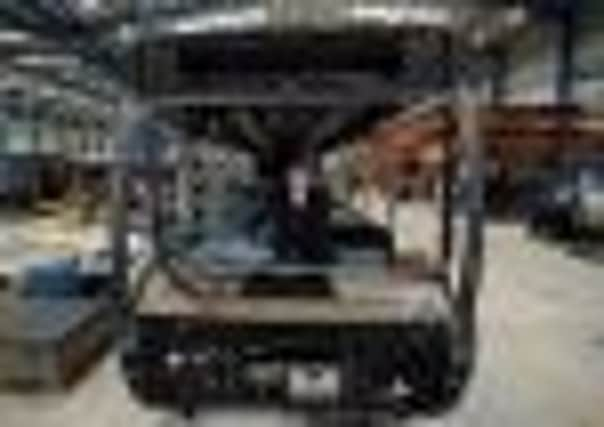Optare’s export ticket to ride the globe


INSIDE a huge building on a West Yorkshire industrial estate lies what looks like a giant Meccano set.
Two parallel production lines with 14 build stations lie side by side. Each station holds a bus at a different stage of completion – from shell to finished product.
Advertisement
Hide AdAdvertisement
Hide AdThe new 140,000 sq ft site in Sherburn in Elmet brings together operations, previously carried out in Rotherham, Crossgates in Leeds, and Blackburn, under one roof, with the potential to double manufacturing capacity to 1,200 buses a year.
Chief executive Jim Sumner hopes the new building, which opened in September, will be the ticket to global expansion. Exports currently account for a small per cent of its volumes but the figure is expected to rise to at least 25 per cent next year.
He said: “The company has always had a history of exporting but a recent exports push has impacted on sales and we are now seeing much bigger volumes, which is a big change for the business.”
The new site is both a manufacturing site and a warehouse. The bus shells are supplied by WEC Group, which is based at the same site, before roofs, glass, panels, seats and engines are installed at Optare and the bus is painted.
Advertisement
Hide AdAdvertisement
Hide AdThe vehicles then undergo final testing to comply with EU regulations before being driven to customers.
Meanwhile, the warehouse supplies bus kits for the export markets. “It’s not always cost effective to ship complete buses from the UK to another country,” said Mr Sumner.
The company currently exports to European countries including Germany, Denmark, Sweden, Malta and Israel. It was recently chosen as the preferred supplier for a major contract to supply 190 buses in kit form to Cape Town in South Africa in mid-2012.
Green technology is another growth area for the company, which has invested £4m in research and development over the last two years to create a new range of hybrid and electric buses.
Advertisement
Hide AdAdvertisement
Hide AdIts Tempo SR product is the lightest bus, which Mr Sumner claims is up to one-and-a-half tonnes lighter than any other bus in its class, improving its fuel consumption.
Mr Sumner said: “That is very much the agenda now. We are trying to make them as fuel efficient as we can. Everyone recognises that low carbon is the way forward to remain competitive.”
The new headquarters also brings together, engineering, sales, after sales and finance departments. “It’s now open-plan and we’ve found that there has been a 40 per cent reduction in emails since making the changes,” said Mr Sumner.
Optare currently makes three buses a day but plans to increase production over the next two years. The company employs 300 people on the site, primarily those who were transferred from Crossgates, but it hopes to create 100 new jobs in the next two years.
Advertisement
Hide AdAdvertisement
Hide AdOver 100 people were employed at the Rotherham site, which closed in 2009. Meanwhile, Optare is reviewing the future of its Blackburn site, which is still manufacturing following the transfer of a number of functions to Sherburn in Elmet.
A declining order book led to Optare’s turnover falling 35 per cent to £52.3m in 2010. Loss before tax was £4.35m, falling from £5.13m. However, the company doubled its order book to £46m in the first six months of the year.
Mr Sumner said the investment in the new site would help to turn around the firm’s financial performance. “These are challenging economic times and the winners are those who invest in the recession not those who invest when it is too late,” he said.
Last year, Ashok Leyland, India’s largest bus manufacturer, bought a 26 per cent stake in the company to strengthen its financial base.
Advertisement
Hide AdAdvertisement
Hide AdMr Sumner said: “Ashok has provided significant support to help reduce our purchasing costs based on their relationship with a number of our suppliers. This will be key in turning the company profitable.”
Bus group’s journey
The Optare name was launched in 1985 from the remnants of the Roe operation in a time of changing and challenging market conditions for UK bus manufacturers following the break-up of the nationalised manufacturing industry.
In 2008 Optare was bought out by an investment firm owned by Roy Stanley, chairman of the Darwen Group.
Later that year the Darwen Group took over the much larger Optare Group to form the AIM-listed company Optare, employing 830 people and with a £90m turnover.
Advertisement
Hide AdAdvertisement
Hide AdIn summer 2010, Ashok Leyland bought a 26 per cent stake in Optare. However Optare’s share price has declined by more than 72 per cent in 2011 despite the promises of new models and the move to new premises.